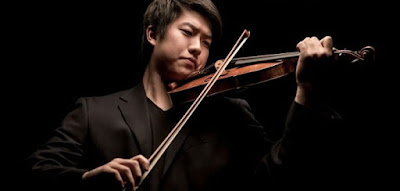ISO closes its severely shortened 2020-21 concert season with distinction
It has been quite moving to hear and see the Indianapolis Symphony Orchestra in its home once again, particularly so Friday in the prominence its concert gave to two of its musicians to get the public exposure they deserve.
Their identification as key parts of the ISO's artistic mission has been interrupted by the pandemic's "Babylonian Captivity" of the orchestra — in which its vitality away from its real base, the Hilbert Circle Theatre, also entailed the inability to exercise its artistry as an ensemble and host of usually excellent guest artists.
I speak particularly of associate, now resident, conductor Jacob Joyce and concertmaster Kevin Lin. Joyce was on the podium for a program nearly up to the exposure the orchestra enjoyed, concert after concert, before March 2020.
The lack of an intermission, part of the COVID-19 restrictions on public indoor events, has forced some shrinkage. Yet this weekend's two concerts, which wrap up the core 2020-21 season, come close to restoring an approach to "the old normal." Last chance to get that feeling for the time being? Today at 5:30.
Joyce opened the concert, shaping the music batonless, with Haydn's Symphony No. 85 in B-flat, the most buoyant and ingratiating of the Austrian composer's Paris symphonies. Especially effective was how the orchestra treated the second-movement "Romanze," a set of variations on a French tune so appealing that it is said to have been a favorite of the ill-fated Marie Antoinette.
 | ||||||
| Kevin Lin displayed the influence of one of his teachers, master of Romanticism Aaron Rosand. |
Dynamic contrast in echoing phrases helped make the movement seem especially indicative of Haydn's ability to communicate with unforced charm. Joyce drew a relaxed suavity from the orchestra that seemed to send a message of welcome to the necessarily small audience. There were tempo adjustments in the Trio of the third movement's Minuet that verged on the cutesy, but this impression may have been the result of incomplete unanimity: How much do we slow down here? Which notes should be slightly extended before the Minuet returns?
Lin came into play with Max Bruch's Violin Concerto in G minor, the most enduring of its composer's considerable output. Without seeming to patronize it or giving it a critical pat on the head, this is an adorable concerto. It has authentic Romantic heft without seeming conflicted about it. Its tunes and the aptness of the way they're decorated are unstinting, and the orchestration supports the soloist well without dominating the partnership.
This weekend's soloist, who was to return in comradely fashion to sit in the concertmaster chair for Stravinsky's "Firebird" Suite, brought an individualistic glow and personal warmth to the piece. His tone displayed a suitable variety, yet the through-line was an intimacy and revelatory quality that made the solo violin's role feel operatic, but as much recitative as aria.
Lin played palpably like a colleague among colleagues, and his mutual rapport with Joyce was evident. I was impressed with how well the considerable acceleration near the end of the finale held together, creating an excitement that was never slapdash.
The concert closed with one of the most popular showpieces of early 20th-century music for orchestra: the 1919 suite Igor Stravinsky made of his "Firebird" ballet. Major episodes of the ballet took their wonted, vivid places in this performance, The Infernal Dance was predictably menacing and energetic, making an apt followup to the tender music of appeal and resolution that signal the Prince's eventual use of the Firebird's magic tailfeather to free prisoners of the evil Kaschei's spell.
I want to single out among this performance's highlighting of Stravinsky's superb color palette the playing of Ivy Ringel, who's among the newer members of the ISO's principal contingent. I don't think I've ever heard the bassoon solo in the Lullaby that heralds the final celebration more beautifully played. It seemed both technically perfect and infused with true emotion. It was a reminder that even a fairy-tale ballet can speak to reality-bound listeners when the music for it creates its own magical connection. Ringel's solo drew richly from that magic and allowed the triumphant final episode to be all the more thrilling.



Comments
Post a Comment